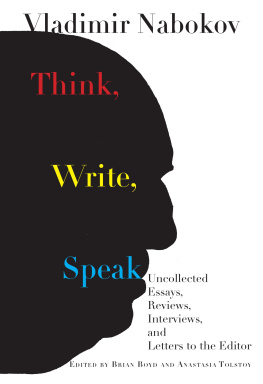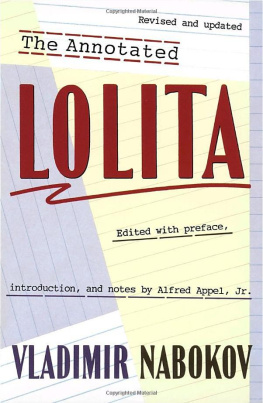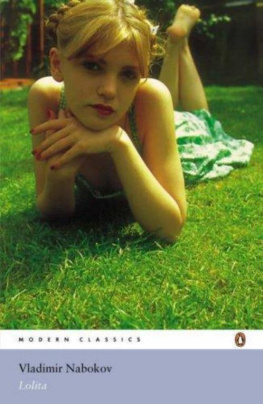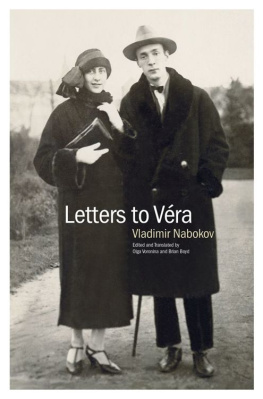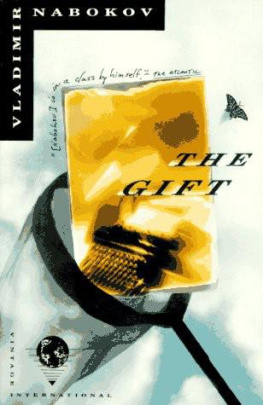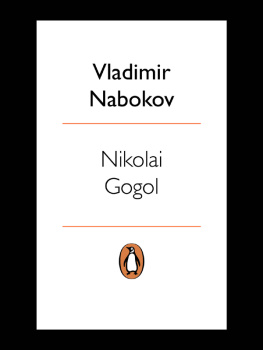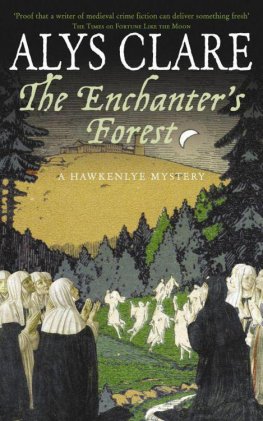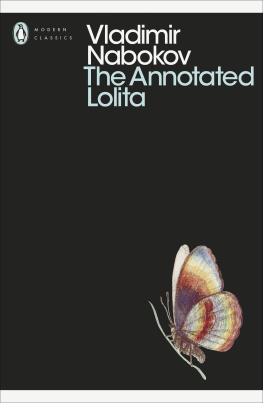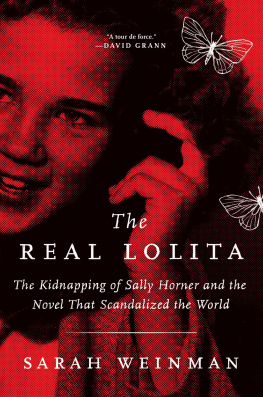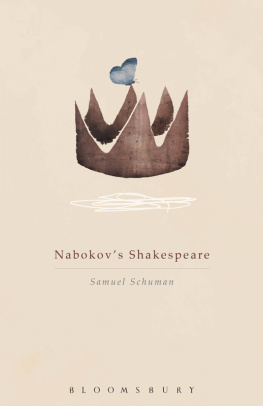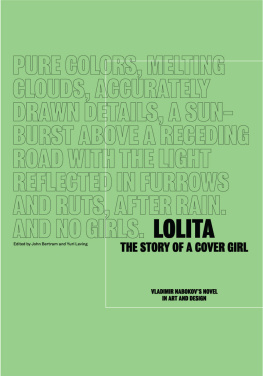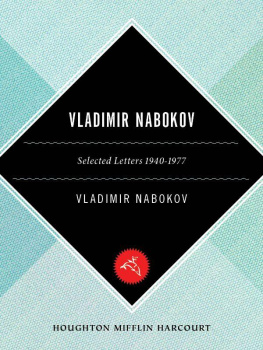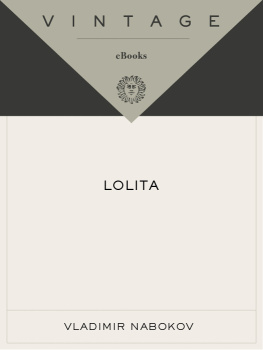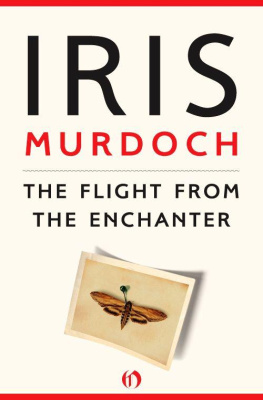Praise for
The Enchanter
A tale of crime and punishment a foretaste of one of this centurys great novels.
Wall Street Journal
The Enchanter is an alarming, sensuous and shimmering forerunner of Lolita. It is a delight to have this early version of Nabokovs strange, compelling fantasy.
USA Today
Sensuous, amusing, scary Nabokov lifts [The Enchanter] through the exhilarating artistry of his poetic and explicit language.
Boston Herald
[The Enchanter is] in the top class of Nabokovs work.
John Bayley, Spectator (London)
Elegantly written and exquisitely shaped.
The Sunday Times (London)
The Enchanter exhibits all of [Nabokovs] cunning and exactness of execution. The Enchanter will indeed enchant.
Listener (London)
One of the most exciting novellas ever written, Nabokov near, or at least clearly anticipating, his very best.
Literary Review (London)

First Vintage International Edition, July 1991
Copyright 1986 by Dmitri Nabokov
Authors Note One copyright 1957 by Vladimir Nabokov
Authors Note Two copyright 1986 by Article 3C Trust
under the Will of Vladimir Nabokov
All rights reserved under International and Pan-American Copyright Conventions. Published in the United States by Vintage Books, a division of Random House, Inc., New York, and distributed in Canada by Random House of Canada Limited, Toronto. Originally published in hardcover by G. P. Putnams Sons, New York, in 1986.
The Enchanter is translated from Vladimir Nabokovs unpublished work entitled Volshebnik. Copyrights in Volshebnik are held by Dmitri Nabokov as trustee of Article 3C Trust under the Will of Vladimir Nabokov. This edition published by arrangement with the Estate of Vladimir Nabokov.
Library of Congress Cataloging-in-Publication Data
Nabokov, Vladimir Vladimirovich, 18991977.
[Volshebnik. English]
The enchanter / Vladimir Nabokov ; translated by Dmitri Nabokov.
p. cm. (Vintage international)
Reprint. Originally published: New York: Putnam, c1986.
Translation of: Volshebnik.
eISBN: 978-0-307-78730-9
I. Title.
PG3476.N3V5513 1991
891.7342dc20 90-55704
Cover art by Megan Wilson and Duncan Hannah
Cover photograph by Alison Gootee
v3.1
To Vra
CONTENTS
AUTHORS NOTE ONE
T HE FIRST LITTLE THROB of Lolita went through me late in 1939 or early in 1940; but I was not pleased with the thing and destroyed it sometime after moving to America in 1940.
Around 1949, in Ithaca, upstate New York, the throbbing, which had never quite ceased, began to plague me again. Combination joined inspiration with fresh zest and involved me in a new treatment of the theme, this time in Englishthe language of my first governess in St. Petersburg, circa 1903, a Miss Rachel Home. The nymphet, now with a dash of Irish blood, was really much the same lass, and the basic marrying-her-mother idea also subsisted; but otherwise the thing was new and had grown in secret the claws and wings of a novel.
V LADIMIR N ABOKOV
1956
Excerpt from On a Book Entitled Lolita originally published in French in LAffaire Lolita, Paris, Olympia, 1957, and subsequently appended to the novel.
It has been established from the manuscript of The Enchanter that the year was 1939.
Father had not seen the story for years, and his recollection had telescoped its length somewhat.
This has since been remedied.
This was true until July 1986, when the Soviet literary establishment apparently realized at last that Socialist Realism and artistic reality do not necessarily coincide, and an organ of that establishment took a sharply angled turn with the announcement that it is high time to return V. Nabokov to our readers.
As an air-raid precaution.
Vladimir Zenzinov and Ilya Fondaminsky.
Madame Kogan-Bernstein.
AUTHORS NOTE TWO
As I EXPLAINED in my essay appended to Lolita, I had written a kind of pre-Lolita novella in the autumn of 1939 in Paris. I was sure I had destroyed it long ago but today, as Vera and I were collecting some additional material to give to the Library of Congress, a single copy of the story turned up. My first movement was to deposit it (and a batch of index cards with unused Lolita material) at the L. of C., but then something else occurred to me.
The thing is a story of fifty-five typewritten pages in Russian, entitled Volshebnik (The Enchanter). Now that my creative connection with Lolita is broken, I have reread Volshebnik with considerably more pleasure than I experienced when recalling it as a dead scrap during my work on Lolita. It is a beautiful piece of Russian prose, precise and lucid, and with a little care could be done into English by the Nabokovs.
V LADIMIR N ABOKOV
1959
Excerpt from a letter of 6 February 1959, in which Nabokov proposed The Enchanter to Walter Minton, then president of G. P. Putnams Sons. Mintons reply expressed keen interest, but apparently the manuscript was never sent. Father was engrossed at the time in Eugene Onegin, Ada, the Lolita screenplay, and checking my translation of Invitation to a Beheading. He probably decided there was no room in his schedule for an additional project.
TRANSLATORS NOTE
I N THE INTEREST of clarifying certain concentrated images (some of which originally stumped me too), and of providing the curious reader with a few informative sidelights, I have prepared a short commentary. In the interest of letting the reader get on with the story, I have placed my comments at the end and have, with one exception, avoided the distraction of footnotes in the text itself.
The Enchanter
H OW CAN I COME TO TERMS with myself? he thought, when he did any thinking at all. This cannot be lechery. Coarse carnality is omnivorous; the subtle kind presupposes eventual satiation. So what if I did have five or six normal affairshow can one compare their insipid randomness with my unique flame? What is the answer? It certainly isnt like the arithmetic of Oriental debauchery, where the tenderness of the prey is inversely proportional to its age. Oh, no, to me its not a degree of a generic whole, but something totally divorced from the generic, something that is not more valuable but invaluable. What is it then? Sickness, criminality? And is it compatible with conscience and shame, with squeamishness and fear, with self-control and sensitivity? For I cannot even consider the thought of causing pain or provoking unforgettable revulsion. NonsenseIm no ravisher. The limitations I have established for my yearning, the masks I invent for it when, in real life, I conjure up an absolutely invisible method of sating my passion, have a providential sophistry. I am a pickpocket, not a burglar. Although, perhaps, on a circular island, with my little female Friday (it would not be a question of mere safety, but a license to grow savageor is the circle a vicious one, with a palm tree at its center?).


